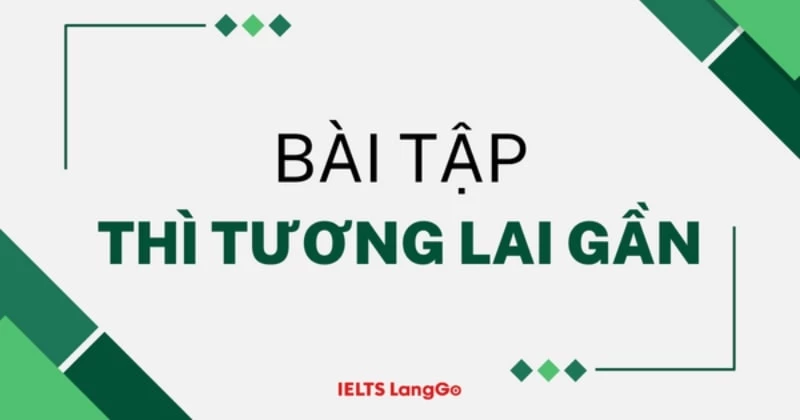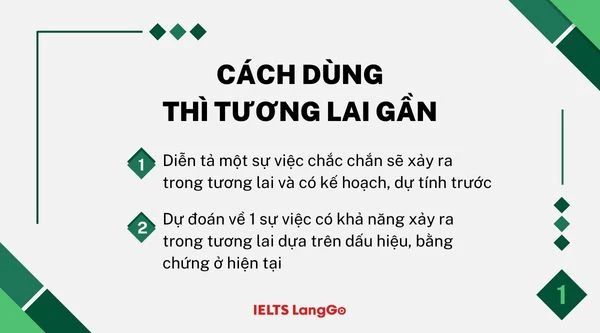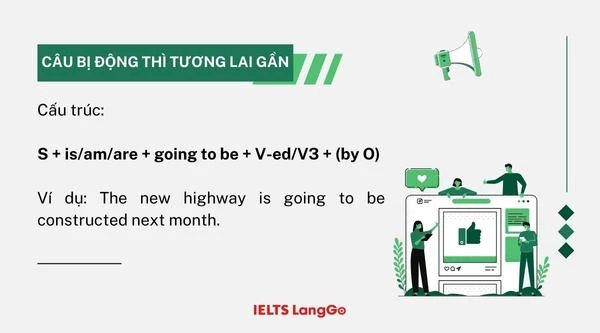


Để thành thạo các thì trong Tiếng Anh thì việc học lý thuyết thôi là chưa đủ mà bạn còn cần vận dụng vào làm bài tập.
Trong bài học hôm nay, IELTS LangGo sẽ cùng bạn review lại kiến thức và thực hành làm bài tập thì tương lai gần Be going to để hiểu rõ và sử dụng chính xác.
Trước khi đi vào làm bài tập, chúng ta cùng ôn lại kiến thức về cách sử dụng, cấu trúc và các dấu hiệu nhận biết của thì tương lai gần nhé.
Công thức của thì tương lai gần (Near future tense) như sau:
Thì tương lai gần được sử dụng trong các trường hợp sau:

Ví dụ: The company has already signed the contract. We are going to start the new project next month. (Công ty đã ký hợp đồng. Chúng ta sẽ bắt đầu dự án mới vào tháng tới.)
Ví dụ: Look at those dark clouds and listen to the thunder. It is going to rain heavily soon. (Nhìn những đám mây đen kia và nghe tiếng sấm. Sẽ có mưa lớn sớm thôi.)
Các bạn có thể dựa vào các trạng từ chỉ thời gian dưới đây để nhận biết thì tương lai gần:
Ví dụ: We are going to plan a company retreat in three months to discuss our future goals and strategies. (Chúng tôi đang lên kế hoạch tổ chức một kỳ nghỉ cho công ty trong 3 tháng nữa để thảo luận về mục tiêu và chiến lược tương lai.)
Ví dụ: Tomorrow, we are going to announce the winner of the competition and award them a cash prize.
Ví dụ: Next week, the company is going to launch a new product that has been in development for the past few months.
Bên cạnh các bài tập ở thể chủ động, bạn có thể gặp những bài tập câu bị động thì tương lai gần. Để chinh phục dạng bài này, các bạn cần nắm được cấu trúc câu bị động của thì này.

Công thức câu bị động thì tương lai gần như sau:
Ví dụ:
Hãy áp dụng ngay những kiến thức mà bạn đã tích lũy được để thực hành bài tập thì tương lai đơn trong Tiếng Anh sau đây:

1. We ________________ (not/start) the project until we receive approval.
2. He ________________ (study) abroad next year.
3. They ________________ (not/attend) the meeting due to a scheduling conflict.
4. I ________________ (travel) to Asia for my vacation.
5. The company ________________ (not/expand) its operations in the current economic climate.
6. She ________________ (not/buy) a new car because hers is still in good condition.
7. We ________________ (move) to a new apartment in a few months.
8. They ________________ (not/visit) the museum because it's closed for renovations.
9. I ________________ (not/forget) to send you the documents by tomorrow.
10. The team ________________ (not/compete) in the championship this year.
11. We _______ (visit) our grandparents this weekend.
12. The students _______ (not/take) the exam tomorrow.
13. _______ you _______ (watch) the movie tonight?
14. My sister _______ (study) abroad next year.
15. They _______ (not/play) football because it's raining.
16. _______ she _______ (cook) dinner for us?
17. I _______ (learn) French this summer.
18. The children _______ (not/go) to school on Sunday.
19. _______ we _______ (meet) at the coffee shop?
20. He _______ (buy) a new laptop next month.
Đáp án
1. are not going to start
2. is going to study
3. are not going to attend
4. am going to travel
5. is not going to expand
6. is not going to buy
7. are going to move
8. are not going to visit
9. am not going to forget
10. is not going to compete
11. are going to visit
12. are not going to take
13. Are / going to watch
14. is going to study
15. are not going to play
16. Is / going to cook
17. am going to learn
18. are not going to go
19. Are / going to meet
20. is going to buy
1. Look at those clouds! It ______________ rain soon.
a. will
b. is going to
c. are going to
d. was going to
2. I have a job interview tomorrow. I ______________ prepare for it tonight.
a. will
b. am going to
c. is going to
d. are going to
3. Look at that beautiful sunset! I think it ______________ be a clear day tomorrow.
a. will
b. am going to
c. are going to
d. is going to
4. What are you going to __________ for breakfast tomorrow?
a. wore
b. wear
c. wearing
d. wears
5. The research team __________ present their findings at the international conference next month.
a. is going to
b. was going to
c. will
d. have been going to
6. The government is going _____ heavily in infrastructure development over the next five years.
a. to invest
b. to have invested
c. investing
d. invests
7. Our team ____________ participate in the championship next year. We've been preparing for it.
a. will
b. don’t
c. is going to
d. not
8. Emily: The team is having a practice session this afternoon. Will you be there? - Mike: Sorry, but __________________________.
a. I will be there on time
b. I will come with you
c. I am not going to do anything else
d. I am going to help my mother clean the house
9. I’m learning Spanish because I ____________ to Spain next month.
a. will
b. won’t
c. ‘m going to
d. ‘m not going to
10. Mark called. He’s under the weather so he ____________ to join the party tonight!
a. will
b. won’t
c. is going to
d. is not going to
11. Look at the sky! It _______ rain soon.
a. will
b. is going to
c. is
12. I _______ help you with your homework later.
a. am going to
b. will C
c. am
13. We have already bought the tickets. We _______ see the concert tomorrow.
a. will
b. are going to
c. are
14. Don't worry! I _______ be late for the meeting.
a. am not going to
b. won't
c. am not
15. She _______ start her new job next Monday.
a. will
b. is going to
c. is
Đáp án
1. is going to
2. am going to
3. is going to
4. wear
5. is going to
6. to invest
7. is going to
8. I am going to help my mother clean the house
9. ‘m going to
10. is not going to
11. be going to
12. will
13. be going to
14. Won't"
15. be going to
1. I hope Ben is recovering/will recover from his illness sooner or later.
2. I've already decided. I won't lend /am not going to lend my brother any money for the new car.
3. Madam, I can see your luggage is quite heavy. I will take/am going to take it if you don't mind.
4. Are you going to do/Will you do anything tonight? We could go to the cinema or have a drink in a pub.
5. The weather forecast says it is warming/will warm up at the end of this week. At last!
6. I'm sorry, Peter. I can't go out with you tonight. Jim and I will meet/are going to meet at the cafe.
7. Do you need an architect, because you are opening/are going to open a new shop?
8. Hurry up, children. We are leaving/are going to leave by the 10.15 train from the Charing Cross station.
9. Please, put the vase back on the table or you will break/break
10. Where are you going, John? - To the back garden. I am trimming/am going to trim the hedges a little bit.
(Nguồn: E-Grammar)
Đáp án
1. will recover
2. am not going to lend
3. will take
4. are you going to do
5. will warm
6. are going to meet
7. are going to open
8. are going to leave
9. will break
10. am going to trim
LAURA: What are you doing this weekend, Jan?
TANYA: I (1) _____ (see) a new play tomorrow at the Royal Court theater.
LAURA: Have you got the tickets yet?
TANYA: NO, I (2) _____ (get) them this afternoon, actually. Would you like to come?
LAURA: Oh, thank you, that would be nice.
TANYA: OK, I (3) _____ (get) you a ticket too.
LAURA: Great ... What time does it start?
TANYA: Eight o'clock, but we (4) _____ (all meet) in the Green Cafe at 7.15.
LAURA: OK, I (5) _____ (meet) you in the cafe, but, er...
I (6) _____ (be) there around 7.30.
TANYA: That's fine.
LAURA: Oh, one other thing ... I've got no money at the moment... I (7) _____ (pay) for the ticket on Saturday. Is that OK?
TANYA: Yes, that's OK, no problem.
LAURA: Great! Why don't we go eat something in the restaurant?
TANYA: That's a good idea. I (8) _____ (phone) the others and see if they want to come too.
LAURA: Good, and (9) _____ (book) a table for us.
TANYA: Great! I (10) _____ (meet) you there in a moment.
(Nguồn: Grammar Bank)
Đáp án
1. am going to see
2. am going to get
3. will get
4. are all going to meet
5. will meet
6. will be
7. will pay
8. will phone
9. will book
10. will meet
Bài 5: Viết lại các câu sau đây bằng cách sử dụng câu bị động thì tương lai gần:
1. We are going to build a new bridge across the river.
—> A new bridge _______________________________________________.
2. They are going to publish the research findings next month.
—> The research findings ________________________________________.
3. She is going to design the new website for the company.
—> The new website ____________________________________________.
4. The chef is going to prepare a special dish for the event.
—> A special dish ______________________________________________.
5. We are going to launch a new product in the market.
—> A new product is going _______________________________________.
6. The government is going to implement new policies to address climate change.
—> New policies to address ______________________________________.
7. They are going to organize a fundraising event for the charity.
—> A fundraising event for the ____________________________________.
8. The team is going to develop a mobile application for the company.
—> A mobile application for the company ____________________________.
9. The company is going to install solar panels on the roof.
—> Solar panels _______________________________________________.
10. The artist is going to create a mural on the building wall.
—> A mural is going to __________________________________________.
Đáp án
1. is going to be built across the river.
2. are going to be published next month.
3. for the company is going to be designed by her.
4. is going to be prepared by the chef for the event.
5. to be launched in the market.
6. climate change are going to be implemented by the government.
7. charity is going to be organized by them.
8. is going to be developed by the team.
9. are going to be installed on the roof by the company.
10. be created on the building wall by the artist.
1. I am go to meet my friends tonight.
2. She is going study English tomorrow.
3. Are you going to goes to the party?
4. We not going to travel this summer.
5. Is he going to buying a new car?
6. They are going to not attend the conference.
7. I am going to plays tennis this afternoon.
8. Are we going meet at 3 PM?
Đáp án:
1. I am going to meet my friends tonight.
2. She is going to study English tomorrow.
3. Are you going to go to the party?
4. We are not going to travel this summer.
5. Is he going to buy a new car?
6. They are not going to attend the conference.
7. I am going to play tennis this afternoon.
8. Are we going to meet at 3 PM?
1. Tôi sẽ đi xem phim chiều nay.
2. Cô ấy không định học thêm tiếng Pháp.
3. Bạn có định mua nhà mới không?
4. Chúng tôi sẽ tổ chức tiệc sinh nhật cho anh ấy.
5. Trời sắp mưa rồi. Nhìn những đám mây kia!
6. Họ không định chuyển đến thành phố khác.
7. Bạn có định tham gia khóa học IELTS không?
8. Tôi sẽ gặp bạn tại quán cà phê lúc 7 giờ.
Đáp án:
1. I am going to see a movie this afternoon.
2. She is not going to learn French.
3. Are you going to buy a new house?
4. We are going to organize a birthday party for him.
5. It's going to rain. Look at those clouds!
6. They are not going to move to another city.
7. Are you going to join the IELTS course?
8. I am going to meet you at the coffee shop at 7 o'clock.
👉 Download file PDF: Bài tập thì tương lai gần PDF.pdf
IELTS LangGo tin rằng những bài tập thì tương lai gần có giải đáp chi tiết trên đây sẽ giúp bạn nắm chắc kiến thức và sử dụng thành thạo thì này. Hãy cố gắng thực hành 15-20 phút mỗi ngày với các bài tập khác nhau. Tập trung vào việc hiểu ngữ cảnh sử dụng thay vì học thuộc lòng. Sử dụng thì tương lai gần trong cuộc sống hàng ngày để ghi nhớ lâu hơn.
Bài viết có phần tóm tắt lý thuyết nên bạn có thể xem lại ngay nếu khi làm bài có phần nào bị quên nhé. Thành thạo thì tương lai gần là bước quan trọng trong hành trình học tiếng Anh. Thông qua 7 dạng bài tập trên, bạn đã có cơ hội luyện tập từ cơ bản đến nâng cao. Hãy nhớ rằng việc thực hành thường xuyên sẽ giúp bạn sử dụng thì này một cách tự nhiên.
Bạn muốn nâng cao trình độ tiếng Anh một cách chuyên nghiệp? Hãy đăng ký khóa học IELTS tại IELTS LangGo ngay hôm nay! Với đội ngũ giáo viên kinh nghiệm và phương pháp giảng dạy hiệu quả, chúng tôi cam kết giúp bạn đạt điểm IELTS mục tiêu. Liên hệ ngay để nhận tư vấn miễn phí!



ĐẶT LỊCH TƯ VẤN MIỄN PHÍ LỘ TRÌNH Săn ƯU ĐÃI lên tới 12.000.000đ